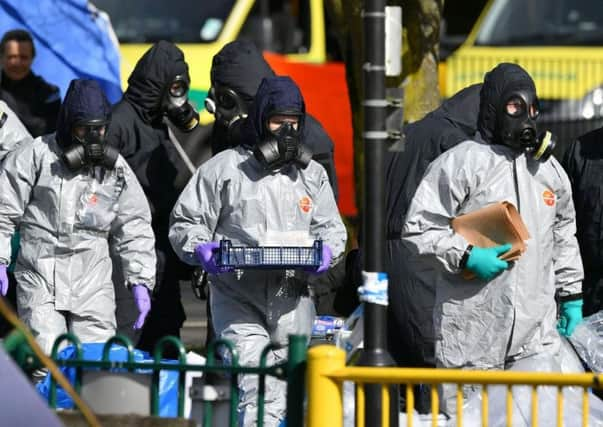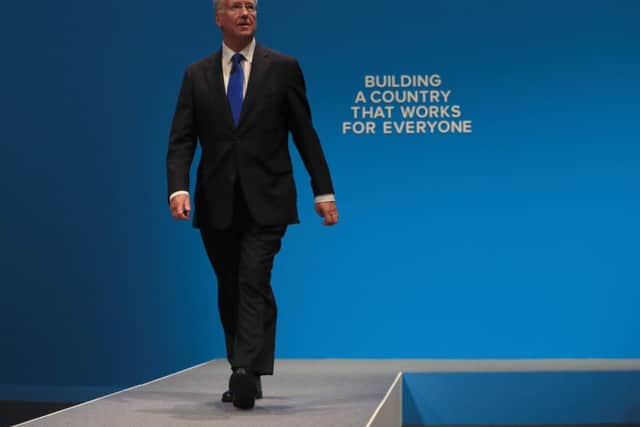Sir Michael Fallon: Russia - why we must learn to get the truth out there faster


The strength of our response, however, only underlines how our policy towards Russia has not worked. Yes, it was well intentioned, yes it was rational — we wanted to see Russia as a partner and a part of the rules-based international system — but it has not worked like that. Our actions have not deterred Russia from repeated misbehaviour.
After Georgia came Crimea. There were sanctions. After those sanctions, thousands of Russian troops were deployed in the Donbass, and we had the shooting down of MH17, including the murder of 10 of our own citizens. Our response to the murder of Alexander Litvinenko clearly did not deter the attempted Salisbury murders. So we have to do more.
Advertisement
Hide AdAdvertisement
Hide AdI welcome that the Government have reserved the right to deploy other measures beyond the expulsions –measures that must surely include making it more difficult for those close to the presidential Administration to do business, raise funds or buy property here in London.


Let me offer four thoughts, none of them particularly original. First, we must rise to the challenge of fake news: the ability of sophisticated enemies like Russia to obfuscate what should be clear, to foster conspiracy where none exists, and to tell blatant lies when they are pushed into a corner. It is the speed with which Russia is able to do that, using propaganda, social media, the “bots” and all the rest of it, that requires our response to be so much quicker. We need to deploy faster truth.
I appreciate the difficulties of revealing or sharing intelligence, but when we have photographs of a mobile launcher that brought down an aircraft, and when we know that an agent as powerful as Novichok could only be developed in the highest-grade, most technically advanced state laboratory, we need to get those facts out far, far more quickly.
Secondly, this was an armed attack on a member of Nato. Under Article Three of the North Atlantic Treaty, Nato members agree “to maintain and develop their individual and collective capacity to resist armed attack”. Nato must now renew its focus on the Russian threat. It must use the July summit to modernise its decision making.
Advertisement
Hide AdAdvertisement
Hide AdThirdly, whether we are Remainers or Brexiteers, we need to come together now to support the security partnership that the Prime Minister described so well in her Munich speech.


One obvious way in which to reinforce the security of what continues to be our continent is to help to reduce Europe’s dependence on Russian gas, which means — even as we leave the European Union — supporting the fledgling European energy market.
Finally, we need to strengthen our defences. Yes, the Prime Minister was right to remind Parliament that we have had a rising defence budget since April 2016, and yes, we do meet the two per cent target, but Russia is not spending two per cent of its GDP on defence; it is spending more than five per cent of its GDP on defence.
Indeed, Russia is spending five per cent of its GDP on conventional weapons, nuclear weapons, cyber and hybrids, and, as we now know, on a completely illegal chemical weapons programme. The Nato two per cent is a minimum and not a ceiling.
Advertisement
Hide AdAdvertisement
Hide AdIn the last year of the last century, the Blair government were spending 2.7 per cent of GDP on defence. That was before 9/11, before Daesh terrorism, before Kim had his nuclear weapons, before cyber-attacks on our own Parliament, and before Russia became more malignant again. I was in the House in 1999, and I do not recall anyone suggesting that our armed forces were overfunded then.
If we want to continue to lead in Nato, on the ground in the Baltics, in the air over the Black Sea, and in the North Sea and the north Atlantic in anti-submarine warfare, if we want to go on playing our part in the counter-Daesh coalition, if we want to prop up fragile democracies in Afghanistan, Ukraine and Nigeria, if we want to go on contributing to United Nations peacekeeping in sub-Saharan Africa, and if we want to maintain a presence in the Gulf and recommit ourselves to protecting international trade routes in Asia-Pacific, we must have the means to do so.
If there is one thing that Salisbury has taught us and we have learnt all over again, it is that what Russia really understands is weakness — countries that will not stand up for themselves, will not protect their people, and will not protect their values and the freedoms that they enjoy.
We have never been such a country, and Salisbury should remind us all that we never should be.
Sir Michael Fallon is a Tory MP. He’s the former Defence Secretary and spoke in a Commons debate on national security – this is an edited version.